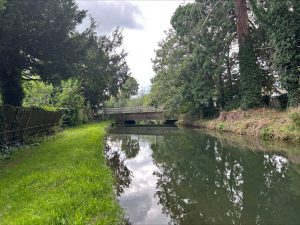Barhale wins New River reinforcement works
1st August 2024 Civil Engineering, infrastructure and tunnelling specialist Barhale has secured a £14.8 million package with Thames Water to carry out vital rehabilitation works on one of London’s oldest water infrastructure assets.
Civil Engineering, infrastructure and tunnelling specialist Barhale has secured a £14.8 million package with Thames Water to carry out vital rehabilitation works on one of London’s oldest water infrastructure assets.
The New River was opened in 1613 as an aqueduct to carry water from Hertfordshire to central London. It originally drew water from springs alongside its route – sources later supplemented by the River Lea and other water courses.
Barhale will refurbish a section of the New River at two locations in Hornsey and Waltham Cross, to prevent leakage and extend the asset life.
In one section, the New River is leaking, losing water and gradually eroding the embankment. Small-scale repairs have been carried out to date and previous drainage works have diverted leaked water into the sewer network to prevent flooding but they have not addressed the root cause of the leakage.
Barhale will strengthen the northern side of the waterway with sheet piling, using a Giken system, which does not use vibration to install the sheets. This will minimise noise and disturbance for the adjacent community.
Rachel Whiteman, Senior Project Manager, Thames Water said: “Over the years, we’ve been carrying out several smaller leak repairs and have put in place different solutions to manage leakage in ways that minimises disruption locally. However, our annual inspections have identified further areas of leakage and we have decided that a large-scale upgrade is now necessary.”
“Barhale are water industry specialists and we’re delighted to be working alongside them to deliver this essential refurbishment work, to prevent leakage and extend the asset life.”
The Barhale team also revised the original design – to build a concrete channel –recommending sheet piling instead as it would offer a more cost-effective solution. The weathering process of the sheet piling will also ensure the riverside blends into the natural environment.
The path of the New River is tightly constrained as it passes through North London making access difficult. Barhale will deploy pontoon barges, initially to carry suction equipment to excavate silt from the river and then subsequently to provide a platform for the lifting crane.
Barhale Regional Manager, John Prendergast, explained that the age of the infrastructure and the narrowness of the route presented additional design considerations. “It’s a bit of a problem getting equipment to the site – hence the decision to use pontoon barges, which we believe is a first for the business.”
“Additionally, the nearness of residents has been a big consideration. Using the Giken system will minimise noise during construction and the decision to use steel sheet piling will ensure that, over time, the works have almost no visual impact.”
Barhale will also be installing sheet piling along a 1.1km stretch of the New River at Waltham Cross, west of the site of the proposed Sunset Studios development. The sheet pile will be of varying length to reach the impermeable London Clay formation to prevent water leakage around the base of the existing sheet piles. When completed, the gap between the new and old piles will be filled with pea gravel to provide additional stability.
According to Barhale’s Contracts Manager, Jacques Deneys, the existing tow path would not support the weight of the piling rig so the team has worked closely with piling specialist Ivor King and OTB Engineering to successfully overcome this issue. “Once we have installed the first 10 sheets it will no longer be a problem,” he said.
The sheet pilling operation will be carried out using a GRB System (GIKEN Reaction Base System) where the entire operation will be running on the new sheet pile wall to install the 1.1km of piles.
Jacques Deneys also highlighted the important measures Barhale is taking to protect the local ecology: “We are working closely with Frog Environmental to specify an innovative bubble curtain to prevent silt debris dispersing through the river and to discourage fauna from approaching the works.”
Work is scheduled to commence July 2024 with a target completion date of September 2025.